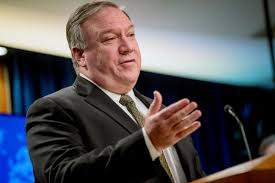Pompeo Welcomes Agreement for U.N. Libya Talks, Urges Speedy Ceasefire Process

U.S. Secretary of State Mike Pompeo on Wednesday welcomed the resumption of talks led by the United Nations between Libya's warring sides and urged speedy negotiations to achieve a ceasefire.
"The agreement between the GNA and LNA to re-enter U.N. security talks was a good first step, very positive," Pompeo said, referring to the internationally recognized Government of National Accord and the Libyan National Army, led by eastern-based commander Khalifa Haftar.
"Quick and good-faith negotiations are now required to implement a ceasefire and relaunch the U.N.-led intra-Libyan political talks," Pompeo told a news conference.
The United Nations Support Mission in Libya (UNSMIL) said on June 2 that Libya's warring parties had agreed to restart ceasefire talks.
Over the past couple of weeks, Libya’s conflict has taken a new turn. In a series of rapid victories, the GNA has, with Turkish support, suddenly brought most of northwest Libya back under its control, dashing Haftar's bid to unite the country by force with help from Egypt, the United Arab Emirates and Russia.
While the United States has said it opposes Haftar's offensive, it has not thrown its support behind the GNA. It has also lambasted Russian involvement, a stance reiterated on Wednesday by Pompeo.
"It’s time ... for all Libyans and all sides to act so that neither Russia or any other country can interfere in Libya’s sovereignty for its own game," Pompeo said.
U.S. President Donald Trump spoke to Egyptian President Abdel Fattah al-Sisi on Wednesday and praised his efforts to promote political reconciliation in Libya, the White House said.
The two leaders discussed ways to resume the U.N. ceasefire talks and the departure of all foreign forces from Libya.
Trump also discussed Libya in a call on Monday with Turkish President Tayyip Erdogan, who said the two agreed on "some issues."
Egypt has also called for a ceasefire starting on Monday, as part of a wider political initiative, which was welcomed by Russia and the UAE. Turkey dismissed it as an attempt to save Haftar following the losses he suffered on the battlefield.
Photo: Secretary of State Mike Pompeo speaks during a news conference at the State Department in Washington, DC, U.S. June 10, 2020. Andrew Harnik/Pool via REUTERS
Link: https://www.nytimes.com/reuters/2020/06/10/world/europe/10reuters-libya-security-usa-pompeo.html











